- Superior Crime Dramas
- Great stories of love, bliss and hurt
- Series that tell you how teens and millennials see the world
- Dramas about strong women getting angry and getting even
- Inventive horror chills
- Provocative foreign-language dramas
- Good short-run series with short episodes
- Dramas about politics, media and culture wars
- Disturbing and enlightening documentaries
- LGBTQ content, both serious and funny
- Comedy, from gentle to scathing
- Stand-up comedy for all sorts of sensibilities
- Espionage of every kind
- Disturbing drama, despised by some, loved by others
I love watching …








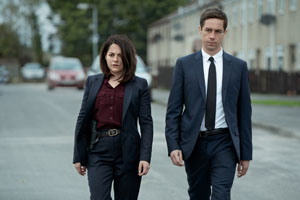
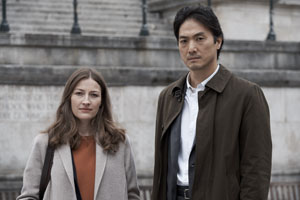
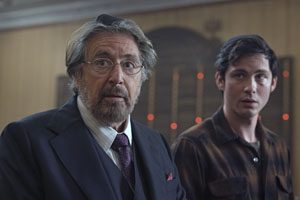


Superior Crime Dramas
Criminal
The idea behind Criminal (Netflix) is ingenious and it stands as a retort to the contrived, unmemorable police procedurals that crowd the network schedules. It’s a 12-part crime anthology series, with each episode focused entirely and unremittingly on a suspect’s interrogation. Thus, people in a room talking. Or refusing to talk, or being coaxed or intimidated into talking. And, really, it’s a set of four series, with episodes set in the United Kingdom, Germany, Spain and France.
The Victim
If your taste runs to grim, tense British crime drama with a dash of immediate social relevancy, check out The Victim (CBC Gem). It’s a four-part drama drenched in psychological trauma, courtroom suspense and the kind of domestic noir that is particular to the best British and Scandinavian productions. It is also a clever mystery with a core-shaking twist at the end, and it leans heavily into the issue of online vigilantism.
Cardinal
As with the superb first season, there is remarkable stillness in the third season of Cardinal (CTV), a quality of quiet intensity. As much as it is about a brutal murder and brutally evil intentions, it’s about unspoken obligations. The six-part series is drenched in the muted colours of fall in Northern Ontario and the muted colours help illustrated the muted lives lived there: the despair and the lust for vengeance, or lunge toward nihilism, that despair can ignite.
True Detective
The third season of True Detective (Crave/HBO) is very, very good, done with some of the precision and perceptiveness of the first season. And that’s mainly because it broods again on moral decay, the fragility of memory and the elusiveness of verifiable truths about events that are soul-destroying. It is about a murder case and the aftermath on those it affects, and it is about the corrosion of a culture.
Killing Eve
Killing Eve (Bravo) returns as gloriously good as it was in its initial season. Its clever, jaunty tone and wickedness are all intact. It is fabulous entertainment. Yet this second season is also a reminder that the series is not really bossed by Sandra Oh. While Oh got the acclaim, Jodie Comer’s work is formidably compelling.
Unbelievable
For much of its eight episodes, Unbelievable (Netflix) is truly grim and enraging, yet addictive. It’s a drama based on a true story and it is hard to define with ease. That’s because it’s a crime thriller and a study of how sexual-assault investigations should be conducted, and how they go hopelessly awry. The police-procedural template is used, then smashed to smithereens.
You
You (Netflix) is very, very good. At first it appears to be a cautionary tale aimed at young women and telling them that terrible things can happen when you make your personal life public on social media. Then, however, it becomes a delicious satirical thriller that upends some common manoeuvres in romcom dramas and, for good measure, gets even more twisted.
Carnival Row
Carnival Row (Amazon Prime Video) is good, but far from perfect as various threads aren’t exactly woven neatly together. It does have several things going for it, even if you’re a bit wary of fantasy storytelling involving faerie folk. The appealing elements here are the cogent theme of simmering racism, plus a murder mystery and a fierce erotic charge that smoulders vividly and bursts into flame often.
Dublin Murders
Dublin Murders (Starz/Crave) has received very mixed reviews, especially in the U.S. In part that’s because there’s a lot going in, and not every reviewer is alert to what the complicated plotting might signify, or how it might resonate with different audiences. It’s a very tricky one, deeply sinister, twisted and involving, but not to everyone’s taste.
Giri/Haji, Wisting, Upright
These three great series exist on the fringes of streaming and cable: Made by BBC TV, Giri/Haji (translated as Duty/Shame) is a unique hybrid of stock British gangster epic and Japanese mob drama that is gloriously different; Wisting (CBC Gem) is a more conventional thriller, deeply embedded in the Scandinavian-noir tradition and based on two novels by Jorn Lier Horst; Upright (Super Channel) is a beauty of a drama-comedy from Australia, an on-the-road odyssey that is both funny and at times deeply moving.
Hunters
Hunters (Amazon Prime Video) is precisely the sort of series that will puzzle some viewers and certain reviewers. It isn’t what’s expected, you see. Presented to the public and heavily promoted as a drama about a miscellaneous crew of regular folks coming together to find and kill Nazis in New York City in the 1970s – and starring Al Pacino as their leader – it is imagined in advance as a propulsive revenge thriller. It is that, but in tone, style and execution, it uses a mad mash-up of methods to tell its story.
Tribal
Tribal (APTN) offers you the basic police procedural template and then shifts the emphasis. The “whodunit” element is almost tossed aside. That’s not what matters. What’s important is the texture of the conversations, the simmering moral judgments, social ridicule and ostracism. It’s a minimalist police procedural that sometimes hits you like a slap in the face. It’s created by Ron E. Scott, whose previous series, Blackstone, is the most underrated Canadian drama of the past decade.
The Oland Murder
The key ingredients for successful, gripping true-crime docuseries are a murder, a puzzle, possible miscarriage of justice and possible mistakes or bias by those in authority. The Oland Murder (CBC Gem) has the key ingredients by the bucketful. CBC’s four-part look at the murder of Richard Oland, of the Moosehead Breweries family, and what happened after is terrific true-crime storytelling. The story is both sensational and macabre, but it isn’t presented as sensationalism. It just digs deeper and deeper with impressive insider access to key players.
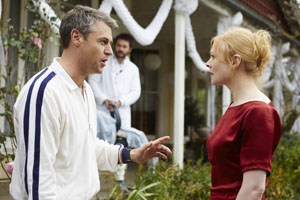

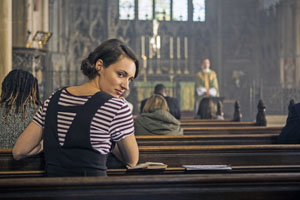
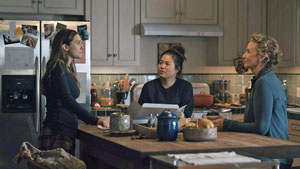

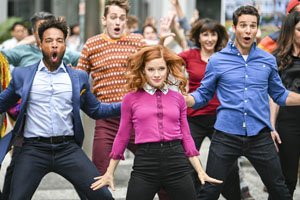
Great stories of love, bliss and hurt
The Beautiful Lie
The Beautiful Lie (CBC Gem) is a stunningly good drama series from Australia, and heartily recommended. The six-part series is about doomed love. How do we know it’s doomed? Because it is a modern adaptation of the central story in Tolstoy’s Anna Karenina, set in modern, upper-middle-class Melbourne.
Fosse/Verdon
Fosse/Verdon (FX) is gloriously good but demands a lot of the viewer. First, it demands that you care about the creation and execution of Broadway musicals and movie adaptations of the genre. Second, it obliges the viewer to enter into a non-linear storyline. Third, and most forcefully, it demands that you care deeply about Bob Fosse, the celebrated New York choreographer and film director, and his on/off relationship with the great dancer and actress Gwen Verdon, a woman who was Fosse’s often unaccredited collaborator and muse. Enter into it and the eight-part series is fabulous, a fine and sometimes searing depiction of creativity and self-destruction.
Fleabag
The return of Fleabag (Amazon Prime Video) for a second season was a major event. The reason for the acclaim is the show’s unique, assertory candour and wit. And part of the surprise element, crucial to that candour, is the character breaking the fourth wall. Fleabag is at times riotously funny but essentially about an emotionally vulnerable woman who is permanently, secretly on the verge of a breakdown. Unmissable as a feat of dark comedy delivered with a kind of panache that is utterly fresh, it is also very, very British.
Sorry For Your Loss
Watched as a package of 20 episodes of 30 minutes each, the strange and sometimes confounding Sorry For Your Loss (Facebook Watch) is an enigmatic totality, an oddly small-scale drama that reaches for profundity and occasionally achieves it. Mind you, it is never a fun watch. That’s because it’s about grief and after two seasons it hasn’t let go of its core mission.
After Life
The latest series created by Ricky Gervais, After Life (Netflix) is infuriatingly difficult to define. It is by turns outrageous, uplifting, unflinching, sad, hilarious and angry. Mostly, it’s an exercise in melancholy. Gervais plays Tony, a middle-aged man who is surly, rude and suicidal. Why is he in this state? His wife died, that’s why.
Zoey’s Extraordinary Playlist
Zoey’s Extraordinary Playlist (CTV) is anchored by Jane Levy – and sublimely so. Like her sitcom Suburgatory, this new series is a highly unusual item on network TV. It’s a risky, expansive show – not quite comedy, drama or musical, though it has elements of all three. All you need to savour it is a bit of soulfulness and tolerance for whimsy. One day, after Zooey’s been having a lot of headaches, she has an MRI. Something happens when she’s briefly in the MRI machine, so that when she emerges, she has this odd new ability – when she encounters certain people, she understands their innermost thoughts through music.

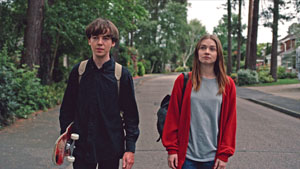
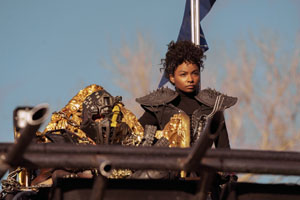

Series that tell you how teens and millennials see the world
Euphoria
Euphoria (Crave/HBO) might be called HBO’s first attempt at a teen drama. Yes, it’s soaked in sex and drugs as advertised. But it is a gorgeously made, rather bleak but sensitive portrait of a particular generation. It’s engrossing, serious-minded adult storytelling.
The End of the F***ing World, Daybreak, Atypical
Three notable Netflix shows about the dark vulnerabilities of youth: The End of the F***ing World’s two seasons are small masterpieces of deadpan dark humour and, simultaneously, deeply shrewd; Daybreak is satire, but while it is loaded with mocking humour, it, too, has great poignancy; and Atypical, which is back for a third season, is the least gloomy and most compassionate of the batch.
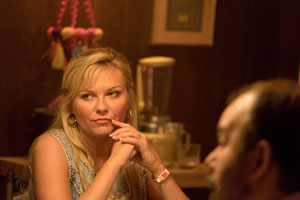

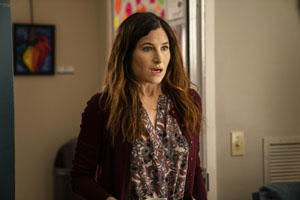



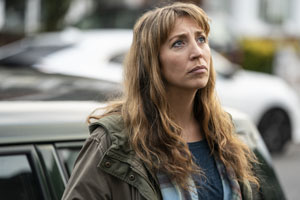

Dramas about strong women getting angry and getting even
On Becoming a God in Central Florida
On Becoming a God in Central Florida (Crave) has an emphatically tough, rounded woman in the central role. It’s about many things, but the Showtime-made, piquantly sour comedy is mainly about American dreams, fallacies and deceit, both personal and societal. It is also terrifically entertaining, twisted and, at times, moving.
The Morning Show
The Morning Show, the flagship drama for the new Apple TV+ platform, is fascinating but flawed, a high-end soap opera about the internal machinations of television, female empowerment and the impact of the #MeToo movement. It is well-crafted, if plodding at times, and while it’s entertaining, it has no urgency to it.
Mrs. Fletcher
In Mrs. Fletcher (Crave/HBO), Kathryn Hahn is the title character in a deliciously nimble, but still heartfelt satire that’s really about motherhood, porn, sex and the life of a single fortysomething woman. There’s a lot going on, but you are never less than awed by Hahn’s full-bore embracing of the role.
Big Little Lies
The second season of Big Little Lies (Crave/HBO) is startlingly good, another exquisite dose of pulpy storytelling; sharply funny, incisive and that all-star cast now has another standout female character, played by Meryl Streep.
The Marvelous Mrs. Maisel
After the pilot, The Marvelous Mrs. Maisel (Amazon Prime Video) wobbled and weaved through multiple episodes. The second season is as delightful as that first episode while still managing to wander off in odd directions. It seems more focused, mind you, the dialogue just a tad more glittering and the essential feminist theme a little more resonant.
Pure
Pure (Super Channel) was cancelled by CBC but rescued for another batch of episodes by Super Channel. It’s a dense drama, grimly beautiful, and it threads a fine line between cops-and-criminal storyline and an examination of stifled religious moralism. The manner of its melodrama isn’t an easy sell. But it’s fiercely good, a rare Canadian TV foray into new territory.
Back to Life
Back to Life (Crave) is about melancholy and magnificently so. It’s one of the strongest series of the year, barely definable by genre-type, being comedy, drama and mystery. It’s also about happiness and the necessity of being upbeat sometimes, no matter what bricks are thrown at you. The person who is relentlessly upbeat is the central figure, Miri Matteson (Daisy Haggard), just released from jail after serving 18 years for a crime that isn’t revealed until several episodes have unfolded.
The Accident
The Accident (Super Channel) could be called a legal drama, and a mystery-thriller, in that it’s about a lawsuit brought against a big corporation. But it’s really about a small, deprived community, the raw human emotions of its citizens, their failing marriages and resentments, and how they have been taken for granted by both government and large corporations. The four-part series seethes with the exasperation and repressed vexations that simmer in small towns left behind when traditional industries fail and the rest of the world moves on.

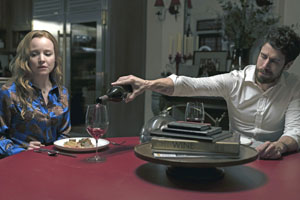



Inventive horror chills
Black Summer
Black Summer (Netflix) is an unheralded little masterpiece of the zombie-apocalypse genre. Don’t be put off by “zombie apocalypse.” This is not like The Walking Dead or any of its spin offs. It’s formally brilliant, politically loaded, terse and terrifying.
Servant
Servant (AppleTV+) is mad, bad but only in a silly-creepy way and enjoyably cock-eyed. It is a lavishly made psychological horror story that seems to lack a sympathetic character. At 10 episodes of roughly 30 minutes, it’s an addictive concoction, as notable for its savage take on thirtysomething bourgeois living as it is for its slow-burning, macabre storytelling.
Dead to Me
Dead to Me (Netflix) is a deadpan, difficult-to-define black comedy with a touch of sinister mystery thrown in. At first, it’s about grief and melancholy, and then along the way, the mystery keeps intruding. What’s admirable about the series – it’s far from flawless and some episodes, like many Netflix shows, are a bit redundant – is how it touches on sorrow and gloom, as those feelings emerge in the gorgeous setting and comfortable lives of the characters.
What/If
What/If (Netflix) is a new, masterful hybrid of the old-school soaper and neo-tawdry mystery. It’s cheesy but please-y in its rabid insistence on outrageous melodrama. What makes it tolerable as escapist entertainment is the ceaseless addition of one twisted storyline after another. Also, the intriguing fact that the callous miscreant is a woman. How could a woman do this terrible deed to another one? Just watch her.
Stranger Things
Stranger Things 3 (Netflix) brings it all back, that charm, by the bucketful. There are eight episodes, so the plotting is tighter – it’s more easily digested as a binge-watch – and, well, it’s summer in the pleasant town of Hawkins. Therefore, everything is sunnier. What Stranger Things amounts to is lovingly crafted escapist entertainment with dark twists to make you curl your toes after you’ve smiled a lot.
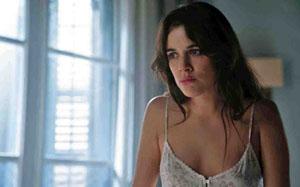

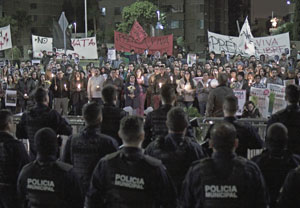
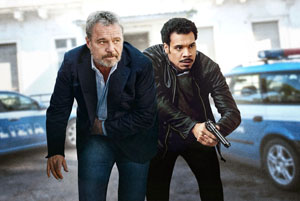
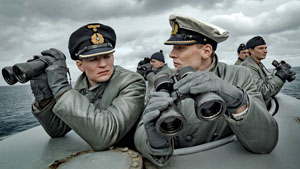
Provocative foreign language dramas
Hache
The short synopsis for Hache (Netflix) does not do it justice: “Helena gains the love of a dangerous heroin cartel leader in 1960s Barcelona and she hones the skills she needs to rise up the ranks.” From that, you get the picture that this is a melodrama about a woman becoming the boss of a drug cartel. Well, that’s been done before. This story is so wildly tangled and strangely shaped that it obviously comes from a very different trajectory of storytelling. It’s a heady concoction that’s literary, disturbing and angry.
Traitors, Tijuana, Carlo & Malik
Three fine thrillers on Netflix, one British, one from Mexico and the third from Italy: Traitors is a six-part Channel 4 production set in the immediate postwar period and the context is paranoia about Soviet influence in Britain; Tijuana is a good political thriller that’s really about the media and about Mexico as it is now, a country where 115 journalists have been killed since 2000; and Carlo & Malik, titled Nero a meta (“half-black”) when it aired in Italy, is the most conventional of the three in that it’s essentially about mismatched cops going about their work.
Das Boot
The eight-episode Das Boot (CBC Gem) is more of a sequel than a retelling of the classic German movie’s narrative. About half the storyline is set on land. And that’s what makes it at first intriguing, especially to anyone who knows the movie, and then it becomes a first-rate, top-drawer wartime thriller.
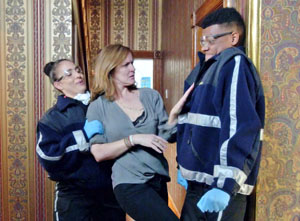
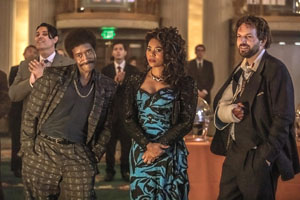
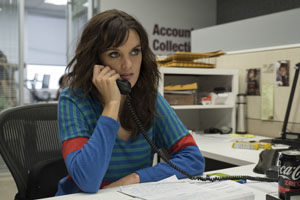
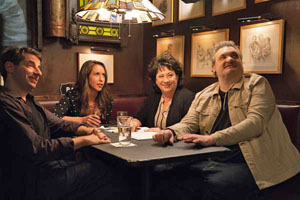
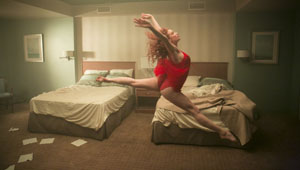
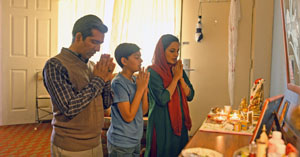
Good short-run series with short episodes
Save Me
Save Me (CBC Gem) is probably the best Canadian series you’re not watching. It’s funny, clever, sometimes melancholy and often beautifully unsettling. We get to know a small team of paramedics and the series – drama/comedy/drollery – manages to drill down briefly into people’s lives and circumstances right before the medics show up in an emergency situation of some sort. Each episode comes in at about 10 minutes and some are remarkably dense.
Black Monday, SMILF, Crashing
Three short-run series that are compelling in short bursts and illustrate how much provocation and power can be achieved: Black Monday (Crave), made for Showtime and intended to offer a fictional background story to the stock-market crash of 1987, is all David Mamet-like dialogue and brief scenes of raw, bawdy comedy; SMILF (Crave) is a very strange beast, in one sense a microcosm drama of what happens to women of a working-class background as they age, in another sense raw, angry and disturbingly at peace with the perversity inside the main character’s head; Crashing (Crave/HBO) has Pete Holmes as the central character, a version of himself, a clean-material comedian who tries to stay true to his conservative religious upbringing.
Room 104
Room 104 (HBO Canada) varies from the desolately funny to the macabre to the strange-but-melancholy. Some episodes are little masterpieces of concise storytelling. An anthology series, the simplicity is both old-school and audacious. Each separate story is set in one room – Room 104 in a motel somewhere.
Little America
Little America (Apple TV+) is an anthology series of eight separate episodes about 35 minutes in length. The scope is modest, but the stories are large in a representative way, and sometimes funny and sometimes tragic. There is nothing grand-scale being stated with billboard-sized messages about immigration. Mostly it’s about everyday lives. There is no overt advocacy and the short dramas are beautifully made.
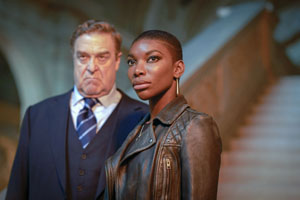

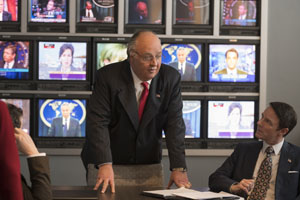





Dramas about politics, media and culture wars
Black Earth Rising
The powerful and very pertinent Black Earth Rising (Netflix) is not popcorn entertainment. Don’t expect to binge easily on it and come away happy. You will be thrilled at times, as there is a genuine sense of menace that pervades it. For a TV drama to enter the arena of the Rwanda massacre and question the role of Europe in enacting International Criminal Court prosecutions is daring and estimable.
Brexit
Brexit, the movie (Crave/HBO), is a blistering take on Britain’s referendum to leave the European Union. About the real figures that pulled off the upset victory of a “Leave” vote, it’s a lethal farce focused on Dominic Cummings, the “geeky analyst” who called the tune in the Leave campaign, and he’s masterfully played by Benedict Cumberbatch.
The Loudest Voice
The Loudest Voice (Crave) is a seven-part Showtime miniseries that stars Russell Crowe as Fox News CEO Roger Ailes. It opens with his death and Ailes in a voice-over declaring that he knows exactly what will be said about him. He doesn’t cackle, which is a relief, because the series is grim enough, a plain but acid account of a terrifying figure, a monster even.
When They See Us
When They See Us (Netflix) is superbly made and startling in its invective aimed not just at a justice system that allowed a miscarriage of justice, but at all of American society. The point of the title is that nobody actually saw the boys, who became known as The Central Park Five, charged for the rape and attempted murder of a young woman jogging in Central Park in 1989, as who they were. They saw black youths and wanted to convict them.
Tales of the City
Armistead Maupin’s Tales of the City (Netflix) is an earnest soap opera about the residents, queer, trans and straight, but mostly queer, living in a San Francisco apartment complex. Based on Armistead Maupin’s books and stories written for The San Francisco Chronicle, it first came to TV as a miniseries made for Channel 4 in Britain in 1993, and then PBS aired it in the United States a year later. It’s bracing and fresh but all that discussion of queerness and trans identity is baked into rather ordinary, sometimes hokey, storytelling.
Chernobyl
The intense mini-series Chernobyl (Crave/HBO) is hard to watch not only because of its grim, realistic depiction of what happens to those exposed to radiation. It’s tough to consume because it’s not just about the notorious nuclear disaster. It’s about the relentless campaign by those in power to deny mistakes, deny the existence of chaos and harm, and spread misinformation. That part of it is as intense as the frightening dramatization of the first hours of the nuclear disaster at a town in Soviet Ukraine in 1986.
Messiah
Messiah (Netflix) is first-rate middlebrow entertainment. It’s a thinking person’s thriller, with a touch of Homeland and a dash of astringent scrutiny of faith. The 10-part series arrived on Jan. 1, promoted as a mystery-thriller about an enigmatic figure, a leader of a cult-like following, who emerges from the Middle East and has a disturbing impact. To some, he’s literally messianic, and to others he’s a dangerous disruptor and probably a terrorist. And to some others, he’s a charlatan.
The Plot Against America
The Plot Against America (Crave) is a six-part series based on Philip Roth’s 2004 novel. In the alternate history the novel presented, Charles Lindbergh is elected U.S. president in 1940 and the folk-hero pilot is firmly against the United States entering the Second World War. He is also elected on a platform that is clearly anti-Semitic. What unfolds is meant to be a cautionary tale about electing people who are unskilled in politics but gifted with populist instincts. The series certainly is that – cautionary to the point of being unnervingly sinister.
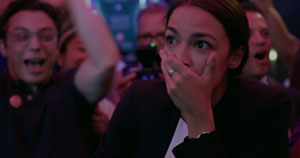
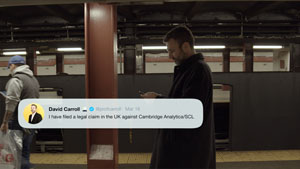

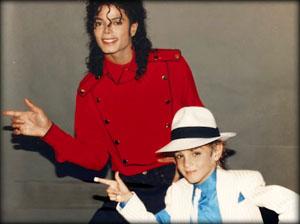

Disturbing and enlightening documentaries
Knock Down the House
In Knock Down the House, documentarian Rachel Lears set out to follow four women who were challenging incumbent Democrats in the primaries ahead of the 2018 midterm elections: Amy Vilela in Nevada, Cori Bush in Missouri, Paula Jean Swearengin in West Virginia and Ocasio-Cortez in New York. What you see when you watch this doc is not adulatory or fawning. It’s a rousing story about ordinary people rising up to challenge establishment figures and aiming to change establishment politics.
The Great Hack
The Great Hack (Netflix) is about data. The object of legal threats in Britain, the documentary is visually stunning and it’s part thriller and part exposé, but mostly it’s a resounding warning about how deeply precious your data is.
Lorena
Lorena (Amazon Prime Video) is a four-part documentary series that sets out to chronicle the events of the Lorena Bobbitt case with the advantage of distance in time and emotion recollected in tranquility. It’s a splendid series, highly recommended, and deeply revealing about how a woman’s story was perverted and then mocked, about our perception of domestic violence, sexual assault and marital rape.
Leaving Neverland
Leaving Neverland (Crave/HB0) is about two men who say Michael Jackson sexually abused them for years. It is grim viewing, deeply unsettling, and you are left shocked and exhausted by it. (It should be said that the program is best avoided by anyone triggered or perturbed by discussions of sexual abuse.) The two-part documentary is neither luridly made nor lascivious. It is essentially a collection of interviews, so it amounts to talking heads relating what happened.
Conor McGregor: Notorious
Conor McGregor: Notorious (Netflix) is a peculiar, shifty sort of three-part documentary about the Irish UFC fighter and his rise to notoriety and great wealth. It’s shifty because there’s not a lot there: He’s in it for the money, and only that. There’s not much of a story behind him.


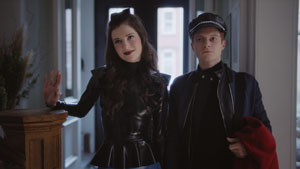
LGBTQ content, both serious and funny
Special, Gentleman Jack
Two shows that are funny and wise, and both set in arenas we are lamentably ignorant about: Special (Netflix) is devilishly funny and madcap – its title plays, ironically, on the situation of its protagonist Ryan (creator Ryan O’Connell), a gay man with a disability; Gentleman Jack (Crave/HBO) is stunningly good, an eight-episode series based on the true story – the diaries, mainly – of Anne Lister, a well-to-do Yorkshire landowner and lesbian who lived an astonishing life of extensive travel and business.
Bonding
Bonding (Netflix) is about sex and sexuality, the dominatrix business, role-playing and, you know, bondage, whips, fetishes and related matters. The series, eight episodes, none running more than 20 minutes each, is a gobsmacker. Funny, smart, delicate and yet simultaneously crude – and in the end, both moving and liberating.
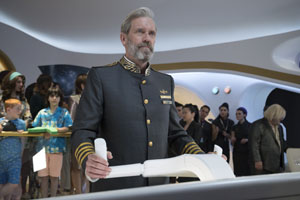
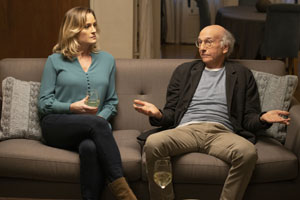

Comedy, from gentle to scathing
Avenue 5
Avenue 5 (Crave) is a nutty new creation from Armando Iannucci (Veep and the British series The Thick of It), and one must hasten to add that it’s not the new Veep. It doesn’t have the brutally scathing put-downs and elaborate insults that marked that political satire. Instead, it’s a more gentle, probing comedy, but still a satire. It’s a hard-to-categorize blend of sci-fi elements and mockery of contemporary mores. What it does have is Hugh Laurie playing Ryan Clark, the dashing captain of the Avenue 5, a luxury cruise ship that moseys about the galaxy. (It’s set 40 years into the future.)
Curb Your Enthusiasm
The ninth season of Curb Your Enthusiasm (Crave), airing in 2017 after a long hiatus, misfired terribly. In the context of the 2016 election and the victory of Donald Trump, the cringe-inducing antics of a misanthropic, rich older white male no longer induced cringe. Now, miraculously, Larry David seems to have rescued the series. It looks much more attuned to the current climate. The fictional Larry David creation we’re looking at on the show is funny because he’s ignorant, idiotic and spiteful. He’s even been called out on his privilege.
Hey Lady!
Hey Lady! (CBC Gem) is a delight, a journey from zany to lawless comedy raucousness. A series of eight short episodes written by playwright Morris Panych specifically for its star, Jayne Eastwood, Hey Lady! is framed as a kooky conceit – the old “lady” believes she’s starring in a TV series and barks orders about moving on to the next scene when she’s bored. Is this some kind of senility? Nope. But the series in which she’s starring is often so rude and foul-mouthed that a ton of the dialogue can’t be quoted.

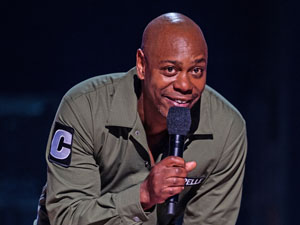
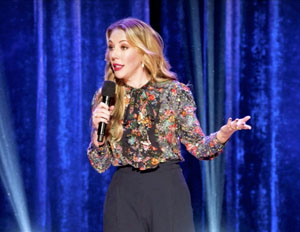

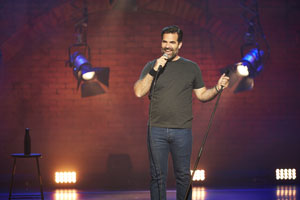

Stand-up comedy for all sorts of sensibilities
Jim Gaffigan: Quality Time, Dave Chappelle: Sticks & Stones
Two comedy specials that are polar opposites and unnervingly so: Jim Gaffigan: Quality Time (Amazon Prime Video) shows Gaffigan – white, middle-aged dad doing unpretentious observational comedy – is actually an absurdist in disguise as a regular guy; Dave Chappelle: Sticks & Stones (Netflix) is the stand-up’s fifth special, and here he continues to provoke but it’s not that funny, yet it’s creepily relevant.
Katherine Ryan: Glitter Room
Katherine Ryan: Glitter Room (now streaming on Netflix Canada) is her second stand-up special. In truth Ryan is more charming than caustic in this special, which was taped in Los Angeles, a place where the audience doesn’t know her from British TV. She’s a brilliant comic performer, adroit at switching in and out of themes and rants that touch on politics, money and day-to-day life while making a living.
Aziz Ansari: Right Now
In Aziz Ansari: Right Now (Netflix), Ansari, who was accused of sexual misconduct, confronts the confusion of the culture and how that confusion led to his situation becoming an impossible matter to discuss with reason and clarity. It’s a very clever construct – his disenchantment with a society in which boundaries confuse and some people compete to be more progressive than others, mirrors the disorienting atmosphere around his own situation.
Rob Delaney: Jackie
Rob Delaney: Jackie (Amazon Prime Video) is odd as all get out. Delaney has had a bizarre career and his material is idiosyncratic. His one hour on stage amounts to series of anecdotes, strange detours, much swearing and, in the end, a story about Jackie, a bearded dragon acquired as a pet for his children, and what happened when Jackie apparently escaped and died. It’s an unorthodox stand-up set and the Jackie story seems off-the-wall, but it is, in a singular way, very powerful and humane.
Pete Davidson: Alive from New York
As a stand-up comedy special Pete Davidson: Alive from New York (Netflix) is unique, and not always in the matter of humour. It’s unsettling, actually. In the barely one-hour show, Davidson is working out a lot of things that have happened to him, especially the events that led him into such a depressive state that people worried about him. Some of it is funny, some more pointedly furious than funny.



Espionage of every kind
The Spy
Sometimes the sheer twisted intensity of a true story carries a series very far. That’s the case with The Spy (Netflix), a six-parter that’s based on the story of real-life Mossad agent Eli Cohen, who went undercover for Israel in Syria in the early 1960s, with spectacular success for a while.
Hanna
Hanna (Amazon Prime Video) is very entertaining, lavishly made and ridiculously uneven. It stands as an example of the wobbly quality of so many expensively made series on streaming services. It is not, mind you, devoid of value. It’s the kind of high-end trashy TV storytelling that often contains surprising depths.
The Rook
The Rook (Crave) is the oddest thing, a muddle of the espionage and paranormal genres. It’s a very interesting mess, mind you. What makes it go awry is the awkward intrusion of the paranormal, monsters, people with superpowers and the rather constrained use of special effects, a technique that, every now and then, explodes into the sudden overuse of garish effects.


Disturbing drama, despised by some, loved by others
Pure
Pure (CBC Gem) is one of the darkest, strangest series to emerge from Britain or any other country in recent years. Marnie (Charly Clive) suffers from a very distinct type of obsessive compulsive disorder. She thinks about sex, and specifically she sees sex unfolding all around her in sudden flashes of disturbing images. It’s called Pure O, and it has made Marnie’s life a living, embarrassing-to-her, hell.
The I-Land
The seven-part The I-Land (Netflix) stars Natalie Martinez, Kate Bosworth and lesser-known actors as a group of strangers who wake up on a mysterious island with no memory of how they got there. It’s a fascinating near-disaster of a series, and yet for all that, it is beyond doubt strangely fascinating and it would be wrong to write off and merely heap abuse on it, as many critics and viewers have done.



